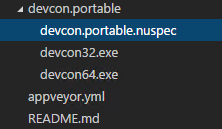Creating a Chocolatey Package in AppVeyor CI
Recently I had a need to have an application published in Chocolatey. If you’re not familiar with Chocolatey, it is:
a Machine Package Manager, somewhat like apt-get, but built with Windows in mind.
The application I needed to package was actually a Microsoft tool called DevCon.exe and is available freely from Microsoft as part of the Windows Driver Kit (WDK). The WDK is a massive 2.5GB download, and I needed this one tiny (80kb) executable to be automatically installed and used as part of some Integration tests for another project using AppVeyor CI. Forcing AppVeyor CI to download and install a 2.5GB WDK just so some integration tests could be run was unreasonable and unworkable.
If you are interested: the reason I needed DevCon.exe was to be able to automatically create Microsoft Loopback Adapters for use in testing some functions of the xNetworking DSC resource. I did this by creating a PowerShell LoopbackAdapter Module that automatically downloads and installs this Chocolatey package.
If you fancy skipping the details of the process and just want to jump in and have a look at the project, you can find it on GitHub.
The package is fairly simple. It just contains a few files:
- AppVeyor.yml - this is the AppVeyor CI definition file that tells AppVeyor how to build this project.
- Readme.md - some details about this project.
- devcon.portable\DevCon32.exe - a 32-bit version of the DevCon.exe copied straight out of the WDK.
- devcon.portable\DevCon64.exe - a 64-bit version of the DevCon.exe copied straight out of the WDK.
- devcon.portable\devcon.portable.nuspec - this is the nuspec package manifest file I created for this package.

The really important files here are AppVeyor.yml and devcon.portable.nuspec. So I’ll cover those in a bit more detail.
The source code for the DevCon application is actually available Microsoft’s own GitHub repository. So in my original version of this project I was actually using AppVeyor to clone this source code and then compile the application using MSBuild as part of the packaging process. This worked really well, but the problem was that the purpose of Chocolatey is to actually install applications that can be validated as being from a trusted source.
What this means is that if I can’t prove that the DevCon32.exe and DevCon64.exe files that are in the Chocolatey package are the ones provided by Microsoft then Chocolatey (will rightly) reject the package.
So if AppVeyor CI compiles the DevCon every time the package is built then the bits won’t match those in the WDK. So unfortunately I had to disable this step in the process and include the DevCon32.exe and DevCon64.exe files copied straight out of the WDK. That way the team at Chocolatey can use the hashes of the files to ensure that they are the same ones in the WDK.
I have however left the compile step in the AppVeyor CI build even though the compiled executable files are not being used anymore.
This is the Chocolatey manifest file for the package. It is really just an XML file that contains the details of your package. To create it I just made a copy of the template manifest file, named it devcon.portable.nuspec and filled in the details.
Alternately, if you have Chocolatey installed, you can run (from PowerShell or CMD):
This will create a new folder called devcon.portable with a file devcon.portable.nuspec in it. You can then just customize the devcon.portable.nuspec with the details of the package. I also deleted the tools folder that was created as I had no need for that.
In my case I ended up with this:
Most Chocolatey packages are designed to automatically download installers from the application creator themselves and install the app silently using the installer. But in our case this is unworkable (2.5GB download). So we need to include the application executables in the package itself and we need them to end up in our %PATH% so they can be found.
To enable this, Chocolatey has implemented a feature where packages that contain the .portable extension will automatically have the contained executables into a special folder called the Chocolatey Tools Folder. This folder is always in the system path.
For more information on .portable packages, see this page.
The AppVeyor.yml file looks like this:
The key part of this file is in the deploy_script section:
The first line changes to the folder containing the devcon.portable.nuspec and devcon*.exe files.
The second line sets the version number in the devcon.portable.nuspec package manifest to match the current AppVeyor version number.
The third line creates the package using the cpack tool.
The last line pushes the completed package to AppVeyor CI as an artifact that we can then download and submit to Chocolatey:

It is probably possible to have AppVeyor CI automatically submit the package to Chocolatey on my behalf, but I didn’t want that in this case. But if you’re planning on doing that, you’ll want to ensure you use the AppVeyor Encrypt Data tool to encrypt any Chocolatey credentials that your AppVeyor.yml file might use - otherwise your Chocolatey credentials are available for the world to see and abuse. This would be very bad indeed!
I have left in the original commands that pull the DevCon repository from GitHub and then compile it using MSBuild. The commands relating to this can be found in the build_script and install sections of the AppVeyor.yml file.
Hopefully this post might help you package up some of your own tools to use distribute with Chocolatey for easy installation or for use with CI services such as AppVeyor.
If you want some more information on using Chocolatey with PowerShell, check out this blog post.
